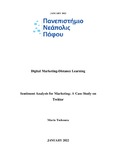| dc.description.abstract | Understanding the consumer public's perspective is a well-known issue that affects all businesses. Nowadays, social media precisely reflects the public's sentiments and thoughts on current events. Twitter, in particular, has garnered considerable attention from experts conducting research on the public's emotions. The utilization of social media data for marketing purposes is rising daily.
Given the foregoing, in this dissertation we examined the sentiment analysis of tweets according to their polarity. We chose a highly popular product, the iPhone13, which is manufactured by Apple, the world's most successful technology firm. More precisely, we gathered 1303 tweets about iPhone13, classified them as positive, neutral, or negative, and after processing the data, we applied the Naive Bayes classifier as well as 10 - fold cross-validation for better accuracy in the results. The experimental results have shown that the preferred classification model received relatively high evaluation results, with an average accuracy of 82.7%. | en_UK |

